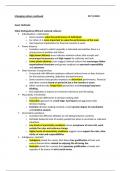Managing culture continued 29/11/2022
Geert Hofstede:
What distinguishes different national cultures:
Individualism v collectivism
o Some societies value the performance of individuals
o For others it is more important to value the performance of the team
o Has important implications for financial rewards at work.
Power distance
o Considers extent to which inequality is tolerated and whether there is a
strong sense of position and status.
o High power distance score indicates national culture that accepts and
encourages bureaucracy and high respect for authority and rank.
o Lower power distance score suggest national culture that encourages flatter
organisational structures and greater emphasis on personal responsibility
and autonomy.
Short-termism v long-termism
o Concerned with different emphases national cultures have on time horizons
for the business planning, objectives and performance.
o Some countries have greater emphasis on short-term performance. Financial
and other rewards based on period of just a few months or years.
o Other countries take longer-term perspective and encourage long-term
thinking.
o Key implication is impact on investment decisions and risk taking.
Masculinity v femininity
o Considers the differences in decision-making style
o Masculine approach to a hard-edge, fact-based and aggressive style
decision-making.
o Feminine decision making involved a much greater degree of consultation
and intuitive analysis.
Uncertainty avoidance
o Considers the different attitudes to risk-taking between countries
o Hofstede looked at level of anxiety people feel when in uncertain or unknown
situations.
o Low levels of uncertainty avoidance shows acceptance of more risk, work
outside the rules and embrace change.
o Higher levels of uncertainty avoidance suggest more support for rules, data,
clarity of roles and responsibilities.
Indulgence v restraint
o Indulgence stands for society that allows free gratification of basic and
natural human drives related to enjoying life ad having fun.
o Restraint stands for a society that supresses gratification of needs and
regulates it by means of strict social norms.
Geert Hofstede:
What distinguishes different national cultures:
Individualism v collectivism
o Some societies value the performance of individuals
o For others it is more important to value the performance of the team
o Has important implications for financial rewards at work.
Power distance
o Considers extent to which inequality is tolerated and whether there is a
strong sense of position and status.
o High power distance score indicates national culture that accepts and
encourages bureaucracy and high respect for authority and rank.
o Lower power distance score suggest national culture that encourages flatter
organisational structures and greater emphasis on personal responsibility
and autonomy.
Short-termism v long-termism
o Concerned with different emphases national cultures have on time horizons
for the business planning, objectives and performance.
o Some countries have greater emphasis on short-term performance. Financial
and other rewards based on period of just a few months or years.
o Other countries take longer-term perspective and encourage long-term
thinking.
o Key implication is impact on investment decisions and risk taking.
Masculinity v femininity
o Considers the differences in decision-making style
o Masculine approach to a hard-edge, fact-based and aggressive style
decision-making.
o Feminine decision making involved a much greater degree of consultation
and intuitive analysis.
Uncertainty avoidance
o Considers the different attitudes to risk-taking between countries
o Hofstede looked at level of anxiety people feel when in uncertain or unknown
situations.
o Low levels of uncertainty avoidance shows acceptance of more risk, work
outside the rules and embrace change.
o Higher levels of uncertainty avoidance suggest more support for rules, data,
clarity of roles and responsibilities.
Indulgence v restraint
o Indulgence stands for society that allows free gratification of basic and
natural human drives related to enjoying life ad having fun.
o Restraint stands for a society that supresses gratification of needs and
regulates it by means of strict social norms.


